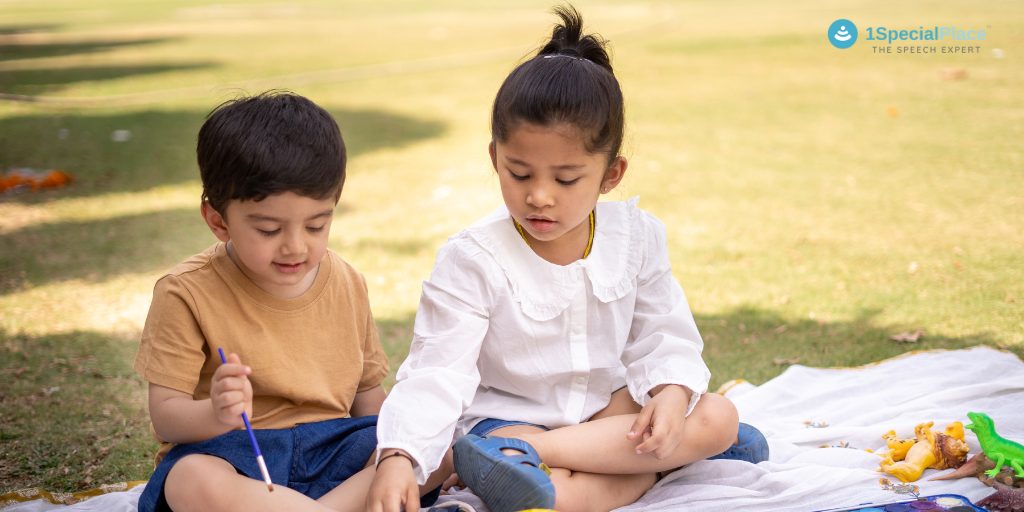
Help Your Child with Speech Delay Make Friends
Tips to Help Your Child with Speech Delay Make Friends
If you have known a child with a speech and language delay, you will know that he/she finds it hard to make friends. Having an early language speech delay affects the child’s ability to understand and express clearly and participate in a group. Socialising with peers, and understanding rules of a group become a challenge for a child with SLD ( Spoken Language Disorder).
Research also shows that, children with language difficulties have smaller friend groups than their peers with typical language skills.
It is heart wrenching for a parent to watch your child play alone. Read further to learn some tips to help your child with speech delays make friends.
Children with speech and language delays have to be taught the skill that they are lagging in. Be it teaching new sounds, new words or sentences, we have to model and teach that skill to the child. This holds true even for friendship and social skills.
Skills needed for making friends
-
Starting conversation
-
Picking on social clues
-
Following social rules
-
Listening to others
The above skills take time to develop in a speech delay in children language. If we can assist and teach these, then half the battle is won.
Check out this free screener to check if your child has a speech delay.
Some tips that can come handy for children with speech delay
-
Indulge in role play : Role play is a great strategy to teach many concepts to your kids. You can pretend to be your child’s friend. Play a game together, use social cues and get involved in starting a conversation. Pick up a toy to be your child’s friend.
-
Work on turn taking: While playing with your child encourage taking turns. Allow your child to wait for his turn and catch non-verbal clues. Sit in a circle on the floor/mat, pull out an engaging activity like play dough fun, building blocks, jenga, playing with animals on a farm etc.
-
Arrange play dates: Arrange for home play dates. Call a couple of close friends and plan for simple fun activities like storytelling, art and craft and eating snacks together. This can be a great way to experience how your child behaves in front of others. This can also be a time for your child to practice the friendship skills with other kids.
-
Include Playground/Park time : Trips to the playground/park are crucial when teaching friendship and social skills. Take your child to the playground and observe how he plays with others. Encourage him to talk to another child. Start with greetings and model out simple correct language. e.g : Say “Hi Roy, I am ( say your name), how are you feeling today?” Do this in front of your child and let him copy you! You should also play with your child in front of other kids. Remember to have a lot of fun.
-
Indulge in Pretend Play: While playing with your child you should model what is acceptable and what is not. e.g: When playing with dolls, use words like “please, thank you, good bye etc. If one doll is hurt, the other should reach out for help and not bully her. Children learn a lot through pretend play. It is their make believe!
-
Stick to a routine : Going to the playground at the same time is essential. When your child starts expecting the same routine, he will do what is being done everyday. This increases his chances of opening out to other kids at the playground/park.It also takes away the stress of communicating with strangers. Kids perform great with routines.
-
Vounteer at the school/day care : Volunteering to help at your child’s preschool or day care can be great for his social skills. You can use the incidents in school to talk about at home. Moreover, having conversations about social situations and closing gaps wherever needed helps.

Resources for teaching friendship skills:
- Puppets: Puppets are great when it comes to teaching social skills. You can pull off a simple friendship story. Give names to characters and share the joy of friends. I particularly like finger human puppets. They catch the child’s attention and are so rich in language.
-
Friendship stories & books: There are many books suitable for young children that teach friendship. I love the Duck and Goose series. Buy here. There are many other books that you can check out in this article by Read Brightly.
-
Social stories: Social stories are another super way to teach social skills of listening, waiting for a turn, starting conversation, empathy, being polite, being kind and more. I like this resource by And Next Comes L . Here is a nice social story resource on YouTube
-
Cartoons : Daniel Tiger is an amazing cartoon series which humanizes social skills for children. I recommend this resource which will help children in expressing their feelings and ideas when with a friend.
- Apps: There are a few apps that you can use. Emoface, On second thought, Smiling mind, and more can be found here.
Every child is unique. In addition, making and keeping friends is difficult at any age. Hence in conclusion, take your child’s lead and do not force him into anything. Above all, seek the support of a speech therapist to ensure that his speech and language keeps progressing. Once your child develops age appropriate language and communication skills, he will also learn to make friends faster.
Parenting is a challenging journey and more so, when you are parenting children with special needs. When we place importance on factors like that, we make our roles as parents more challenging. It is important to note that the change in our lifestyle also demands a change in our approach.
Let me know how you liked this piece! Please leave a comment.
At 1SpecialPlace you have the opportunity to become confident in your communication and to learn from the finest. With our exclusive service of Online Speech therapy India and have a pool of best online speech therapists in India. With us by your side, you will receive cutting-edge treatment from the comfort of your own home.
- Addressing the Silent Struggle in Special Needs Children - December 22, 2023
- Swallowing Difficulties: A Comprehensive Guide - December 12, 2023
- 6 Simple Steps to Enhance Speech Clarity and Connect with Confidence - November 3, 2023

Leave a Comment
(0 Comments)